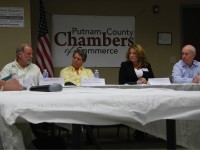Putnam Chambers of Commerce Seeks Recreation, Arts and Culture
 The Putnam County Chambers of Commerce (PCCC) released a report calling for the generation of more in the way of recreation, culture and the arts as ways to increase economic activity in the county.
The Putnam County Chambers of Commerce (PCCC) released a report calling for the generation of more in the way of recreation, culture and the arts as ways to increase economic activity in the county.
The report was discussed at a meeting of the chambers on Nov. 12 at Putnam Hospital Center in Carmel. In addition to members of the collective chambers, several members of planning, zoning and town boards, as well as Assemblyman Steve Katz (R-C-Mohegan Lake), participated in the meeting.
PCCC Chairwoman Jennifer Maher said in the summer of 2012 a task force was created by her organization to seek ways to increase economic growth in Putnam.
“It was believed by that by focusing on promoting one or more specific types of industry clusters, the six towns and the county can make better use of the limited available resources and increase our success at attracting new businesses,” she said. “This would lead to an increase in economic vitality for the county and create a more stable economic base.”
The task force recommended creating “Arts and Culture” and “Commercial Recreation Activities” business clusters. As stated in the PCCC report, “An industrial or business cluster is a group of firms and related businesses and institutions that are located near one another and that draw productive advantage and synergy from their mutual proximity and connections.”
The Arts and Culture clusters called for the in the task force report included many potential activities, including theaters, dance companies, museums, libraries, movie projects, and music venues.
“Also included in the category are craftsmen and artisans,” Maher said. “The second class, Commercial Recreation Activities are for-profit active and passive recreation activities including athletic facilities and stadiums, sports domes, boating, archery, shooting, baseball, gymnastics, paintball and skiing,” Maher said.
“In order to promote business clusters for Arts and Culture and/or Commercial Recreation, several changes must be made within the local government structure to foster the right economic climate for these clusters to grow and thrive,” Maher said. “These changes including having zoning conducive to promoting these types of activities, public and private marketing of both events and available resources, public investment in infrastructure and facilities, and public/private partnerships to promote events and activities.”
At last week’s meeting, Thomas LaPerch, chairman of the Putnam County Economic Development Corporation, said even though he supported the task force’s ideas, there would be difficulties in creating the clusters due to financial constraints.
“The state’s broke,” LaPerch said. “We have no money (locally).”
The two- percent property tax cap from the state and unfunded mandates from Albany has placed financial burdens on municipalities in New York, LaPerch said. New development is also constricted by constraints from the New York Department of Environmental Protection, he said.
Kats said he agreed with LaPerch’s call for the end of unfunded mandates from the state, but eliminating the mandates would not be simple.
“State government is not going to change overnight,” Katz said. “Problem number one is the unfunded mandates.”
Katz added that 96 cents of every dollar collected in property taxes on the local level goes toward the mandates.
The Nov. 12 gathering was the second annual Chambers meeting. Maher said the PCCC is seeking to schedule another meeting with municipals officials and possibly school district officials in six months.

Adam has worked in the local news industry for the past two decades in Westchester County and the broader Hudson Valley. Read more from Adam’s author bio here.


